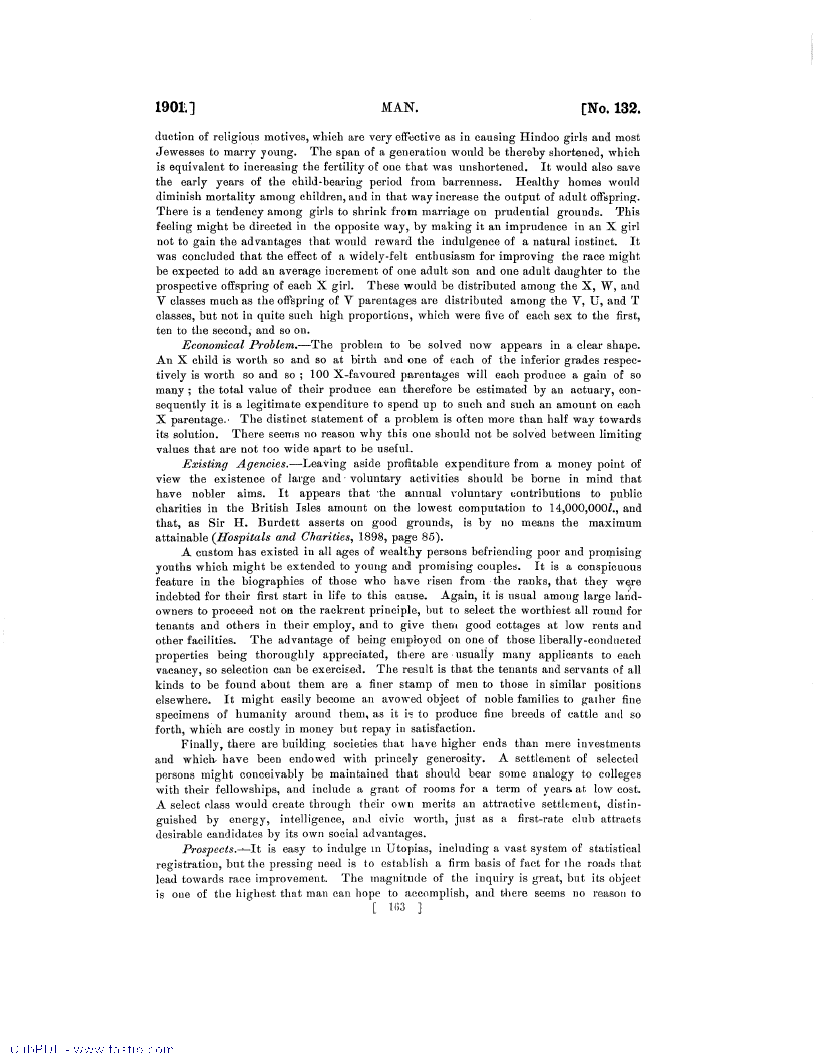OCR Rendition - approximate190t] MAN. [No. 132.
duction of religious motives, which are very effective as in causing Hindoo girls and most Jewesses to marry young. The span of a generation would be thereby shortened, which is equivalent to increasing the fertility of one that was unshortened. It would also save the early years of the child-bearing period from barrenness. Healthy homes would diminish mortality among children, and in that way increase the output of adult offspring. There is a tendency among girls to shrink from marriage on prudential grounds. This feeling might be directed in the opposite way, by making it an imprudence in an X girl not to gain the advantages that would reward the indulgence of a natural instinct. It was concluded that the effect of a widely-felt enthusiasm for improving the race might be expected to add an average increment of one adult son and one adult daughter to the prospective offspring of each X girl. These would be distributed among the X, W, and V classes much as the offspring of V parentages are distributed among the V, U, and T classes, but not in quite such high proportions, which were five of each sex to the first, ten to the second; and so on.
Economical Problem.-The problem to be solved now appears in a clear shape. An X child is worth so and so at birth and one of each of the inferior grades respectively is worth so and so ; 100 X-favoured parentages will each produce a gain of so many ; the total value of their produce can therefore be estimated by an actuary, consequently it is a legitimate expenditure to spend up to such and such an amount on each X parentage. The distinct statement of a problem is often more than half way towards its solution. There seems no reason why this one should not be solved between limiting values that are not too wide apart to be useful.
Existing Agencies.-Leaving aside profitable expenditure from a money point of view the existence of large and voluntary activities should be borne in mind that have nobler aims. It appears that 'the annual voluntary contributions to public charities in the British Isles amount on the lowest computation to 14,000,0001., and that, as Sir H. Burdett asserts on good grounds, is by no means the maximum attainable (Hospitals and Charities, 1898, page 85).
A custom has existed in all ages of wealthy persons befriending poor and promising youths which might be extended to young and promising couples. It is a conspicuous feature in the biographies of those who have risen from -the ranks, that they were indebted for their first start in life to this cause. Again, it is usual among large landowners to proceed not on the rackrent principle, but to select the worthiest all round for tenants and others in their employ, and to give them good cottages at low rents and other facilities. The advantage of being employed on one of those liberally-conducted properties being thoroughly appreciated, there are usually many applicants to each vacancy, so selection can be exercised. The result is that the tenants and servants of all kinds to be found about them are a finer stamp of men to those in similar positions elsewhere. It might easily become an avowed object of noble families to gather fine specimens of humanity around them, as it is to produce fine breeds of cattle and so forth, which are costly in money but repay in satisfaction.
Finally, there are building, societies that have higher ends than mere investments and which, have been endowed with princely generosity. A settlement of selected persons might conceivably be maintained that should bear some analogy to colleges with their fellowships, and include a grant of rooms for a term of years at low cost. A select class would create through their own merits an attractive settlement, distinguished by energy, intelligence, and civic worth, just as a first-rate club attracts desirable candidates by its own social advantages.
Prospects.-'--It is easy to indulge in Utopias, including a vast system of statistical registration, but the pressing need is to establish a firm basis of fact for the roads that lead towards race improvement. The magnitude of the inquiry is great, but its object is one of the highest that man can hope to accomplish, and there seems no reason to
1G3
CIibPDF - www.fastio.com
|

